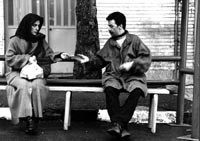
Drama | Film Analysis | Film Reviews | Massachusetts
One More Day
Written by Chris Cooke | Posted by: Anonymous
The protagonist of Babak Payami’s "One Fine Day," showing December 8 and December 16, is himself a man of limited freedom. He obtains leave each day from prison under the pretense of caring for his sick wife, but he spends his "free" days wandering through town, riding buses, sitting in cafes. The medicine he gets for his wife he sells to a man known as Black Mostafa. Never do we see any sick wife at all.
We do, however, see him exchange glances of guarded longing (and the occasional hushed word) with the same woman every day on the bus. Who is this woman who, adhering to the strict cultural mores, sits concealed beneath her robes; what does he, a man with four years left of his sentence, want from her? As the film progresses, the lies he tells about the supposed sick wife become more belabored, his chances of getting day leave slimmer and slimmer. And it becomes clear that the few minutes he spends on the bus with this woman — sitting across from her on the bus, both of them forcing themselves to avoid eye contact only to succumb to a fateful, hesitant peek — are his most precious moments of his day, and most likely hers as well.
The dialogue in the film is sparse; we have to piece together the story in fragments. And Payami is patient with the camera, filming in long stationary shots, letting the hustle-and-bustle of the city take center stage. The movements of people and vehicles back and forth across the screen — obscuring the hero, cutting him off from our sight — accentuate the transitory nature of human interaction. He is pushed to the background, insignificant and isolated, an imposter, only pretending to be as free as his fellow men. It is hardly insignificant that neither he, nor the woman he begins almost to stalk, is named.
This sense of doom and alienation that pervades the film is balanced by the general good will the people of the film have toward one another. Total strangers help each other in small ways, and the pleasantries exchanged with a vendor of cigarettes make the world seem a pleasant place. Indeed, the film begins with a street sweeper who flags down a passing truck so the driver can recover some goods that fell out the back. The potential for good in the world is great, the film seems to say; there is hope for connection, even if it is fleeting.
In the midst of this world, a world filled with both isolation and hope, the man and woman of the tale try to shape something meaningful between them. "One More Day" is a subtle, moving film, one that rewards close attention. Take a break from the fast-paced action and toilet humor of Hollywood and go see this quiet film, while you can.









